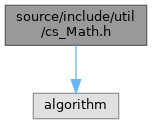Loading...
Searching...
No Matches
cs_Math.h File Reference
#include <algorithm>
Include dependency graph for cs_Math.h:

This graph shows which files directly or indirectly include this file:

Go to the source code of this file.
Classes | |
| class | CsMath::Interval< T, S > |
| Represents an interval by two unsigned integers [base, base + diff]. More... | |
Namespaces | |
| namespace | CsMath |
Functions | |
| template<class T , class U > | |
| constexpr T | CsMath::SafeAdd (T lhs, U rhs) |
| returns lhs+rhs, clamping return values that would roll over to the min/max values of lhs. More... | |
| template<class T , class U = int> | |
| constexpr T & | CsMath::Increase (T &obj, U diff=1) |
| roll over safe variant of ++some_value; More... | |
| template<class T , class U = int> | |
| constexpr T & | CsMath::Decrease (T &obj, U diff=1) |
| roll over safe variant of –some_value; More... | |
| template<class T , class M , class U = int> | |
| constexpr decltype(auto) | CsMath::DecreaseMember (T &obj, M member, U diff=1) |
| Identical to the other decrease function. More... | |
| template<class T , class S > | |
| auto | CsMath::mod (T v, S m) -> decltype(v % m) |
| Returns the canonical representation of [v] considered as element of Z/mZ, regardless of any silly features C++ board thought that would be better than actual math when using non-positive input. More... | |
| template<class T , class S > | |
| auto | CsMath::min (T l, S r) |
| template<class T , class S > | |
| auto | CsMath::max (T l, S r) |
| template<class V , class L , class U > | |
| auto | CsMath::clamp (V value, L lower, U upper) |
| Returns: More... | |
| template<class T > | |
| T | CsMath::round (float val) |
| Rounds a numeric value. More... | |